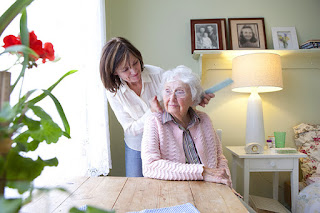Signs that a senior needs in-home care
We all want to stay independent as long as our health allows, especially seniors. The aging process affects us all in different ways. Some aging adults might require minimal help, some do more due to declining health issues, an illness, a condition and or a disease. In most cases, seniors will not communicate to admit that they need outside help to continue living in their own homes, or their place of living.
If you have an aging parent or know a senior you are concerned about that this person has become unable to manage to live independently, ensure to keep an eye on the below main warning signs:
Struggling to maintain the Activities of Daily Living (ADLs)
Changes in physical health & appearance
Cognitive decline - forgetfulness, ability to concentrate & memory loss
A lack of communication with family members and or loved ones
Trust issues & decline in healthy judgement
Self-isolation & Depression
The Activities of Daily Living refer to our basic skills and ability to take care of ourselves and are a sign of the status of functionality. Simple tasks such as showering or bathing, dressing, toileting, grooming, walking, mobility, meal prep, taking medications, continence, shopping & errand, transportation & more do become more challenging as we age. Keeping a healthy routine is most crucial for aging adults.
Seniors will often hide any issues pointing to them struggling with one or more tasks & activities of daily living. Often the family and loved ones won't notice until a fall or a medical emergency occurs which leads to hospitalization.
Find a routine that works for you to monitor any decline in the above activities. In many cases family members notice physical changes first before they notice a decline in functionality and or in cognition & memory. Make a list of any changes you observe. Below are some helpful indicators:
Any difficulties in meal preparation, cooking & shopping, eating and weight loss due to a poor diet
A lack in personal hygiene due to infrequent showering/bathing, grooming & dressing
Bruises or wounds that can indicate a tendency to fall and a mobility decline
Uncleaningnes in the home, especially in bathroom & kitchen
A lack of healthy, low food supply and or spoiled food in the fridge
Unclean & stained bed linens, towels, furniture or carpets
The smell of urine in the home
A person wearing the same clothes
No cleaning or laundry supplies
Piled up laundry
Unfilled prescriptions and unopened mail
Clutter and possible hoarding
Neglect to dispose of spoiled food & garbage
Forgetfulness to perform tasks, missing appointments, medications
Repetitive speech patterns - unable to complete a sentence
Misplacing things, confusion and irritability
Personality changes - loss of reasoning skills
Decline in finances & paying bills
Getting lost walking or driving
Unsafe driving and any dents or scratch on the car
Tripps & possible falls in the home and on outings
Feeling down & depressed and having negative thoughts
Declining social skills and low self-worth
You can help by starting a casual conversation to explain that being flexible & open to outside help will increase the ability to stay longer independent. Refer to all available senior living options and consider the person's financial situation. Respect wishes & values which will help determine where the person wishes to age in place.
Carefully monitor the person's changes in overall health & behaviours and take action to help. Keep in mind that any seniors with cognitive decline won't remember the conversation. In that case, refer to the https://alzheimer.ca/bc/ for more help in managing to converse with Dementia & Alzheimer's patients.
Consult with a private quality home care company that offers flexible services with, qualified, compassionate & consistent caregivers who assist with Personal Specialized Care, Companionship & Homemaking. In-home senior care will enhance a senior's life in many ways, allowing more quality time as well as peace of mind for family & loved ones.
Ensure to speak with all family members and, if you are authorized, consult with the seniors Family Physician for health & medication info. Do more research on Advance care planning. Many seniors have a Power of Attorney who will help them
to start the in-home care process, or if required, qualified transition support to higher-level care.
Call Just Like Family Home Care Burnaby & New Westminster for a free in-home consultation at 604.725.7254




Comments
Post a Comment